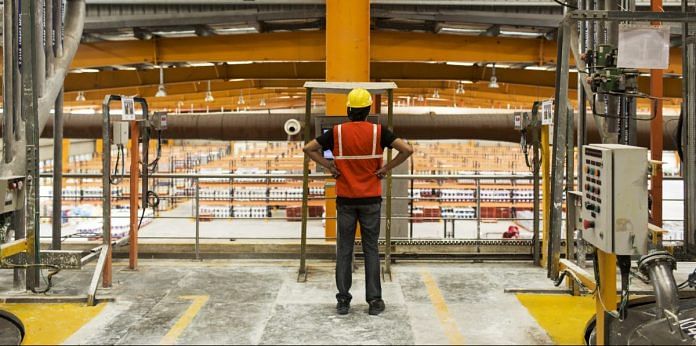The Covid-19 pandemic is a black swan event in our lives. The novel coronavirus has put us through a never-seen-before lockdown. India is staring at a long road towards economic recovery and several reputed rating agencies have stated that an unparalleled global recession is underway, owing to the disruptions. Fitch has forecast India’s GDP growth slipping to 0.8 per cent for the 2020-21 fiscal.
However, a crisis like this also brings with it opportunities to look inwards and make certain desirable changes. In this backdrop, state governments in Uttar Pradesh, Gujarat, Goa and Madhya Pradesh have undertaken labour reforms to attract investment. Their policy initiative has invited both criticism and praise.
In the post-Covid world, it will only be the survival of the fittest. Therefore, it was imperative that these labour reforms were undertaken. Industries operating in these three states will have the power to hire and fire; working shifts will be increased from 8 hours to 12 hours, and there will be a sizeable reduction of compliance regulations. The three main stakeholders to benefit from these reforms are the workers, companies and the economy at large.
Also read: Renu Kohli calls labour reforms a caricature, Shyam Saran on China’s move to digital money
How it works for workers
Migrant workers who were employed in big cities are now heading back to their home states and many may not return, at least in the near future. These reforms will result in bringing jobs to the workers’ doorstep. A major chunk of migrant workers who travel to big urban centres in search of livelihoods come from these states.
Nearly 90 per cent of India’s estimated 47 crore workforce is not benefitting from the existing labour law provisions. In fact, these laws have served as a deterrent to newer businesses. The announced relaxations will not only incentivise but also create new industrial investment opportunities, resulting in more jobs for the workers at a time when the unemployment rate has hit a record high of 27 per cent.
Also read: Yogi must learn from Shivraj Singh Chouhan on labour reforms. UP needs a scalpel, not an axe
How the companies benefit
There are as many as 40 central labour laws in India and states also have their own set of legislations governing the industry and labour. A majority of these labour laws were introduced in the years right after the Independence. The importance of these laws in that era cannot be understated, however, they have not stood the test of time. In 1991, even though India liberalised its economy, it failed to reform its labour laws.
These laws have proved to be a hurdle for investment in India, and can best be described as archaic. Scrapping such archaic labour legislations can provide India the investment push.
As a fallout of Covid, it is expected that several businesses will move out of China. India must take advantage of it. We need to introspect as to how India can become a more favourable option for the world, compared to a country like Vietnam, which has already implemented bold labour reforms. These reforms will give industries the operational freedom they require and they will not be subjected to the usual compliance rigmarole.
Also read: India’s heartless capitalists deserve the labour shortages they are about to be hit with
How the economy gains
The economy at large will be the biggest beneficiary of these reforms. If an industry is set up or expanded, it is not only the workers or the company which will benefit. The expansion will also lead to job creation across different sectors, which will result in a higher purchasing power of the people, and an increase in revenue for the government. Metros are the major engines of economic growth in India, but these reforms have the capacity to create new growth pockets in villages and small towns, too.
These labour reforms, to some, may come across as harsh measures, but we should also remember that the Indian economy currently is in doldrums, owing to the pandemic. The reforms undertaken are the need of the hour and we cannot fall into a trap, construing these measures as anti-labour. If India is to gain a competitive advantage over other nations to transform itself as a manufacturing hub and become self-reliant, it is necessary that such steps are undertaken.
The International Monetary Fund in August 2018 had termed the Indian economy as an elephant starting to run. These labour reforms have the potential to allow the elephant to break the shackles and move forward leaps and bounds.
Janay Jain is a law student at Government Law College, Mumbai. Views are personal.




What is he talking about? How is hire and fire good for employee? How working for long hours without any monetary benefit good for workers? This is capitalist set-up of taking advantage of helpless citizens during pandemic. What is this ????
Well said.
Labour “reforms” does not mean doing away with all labour laws. One doesn’t cut the head to cure a headache.
Labour “reforms” does not mean using the pandemic as an excuse to exploit the most helpless sections of the society.